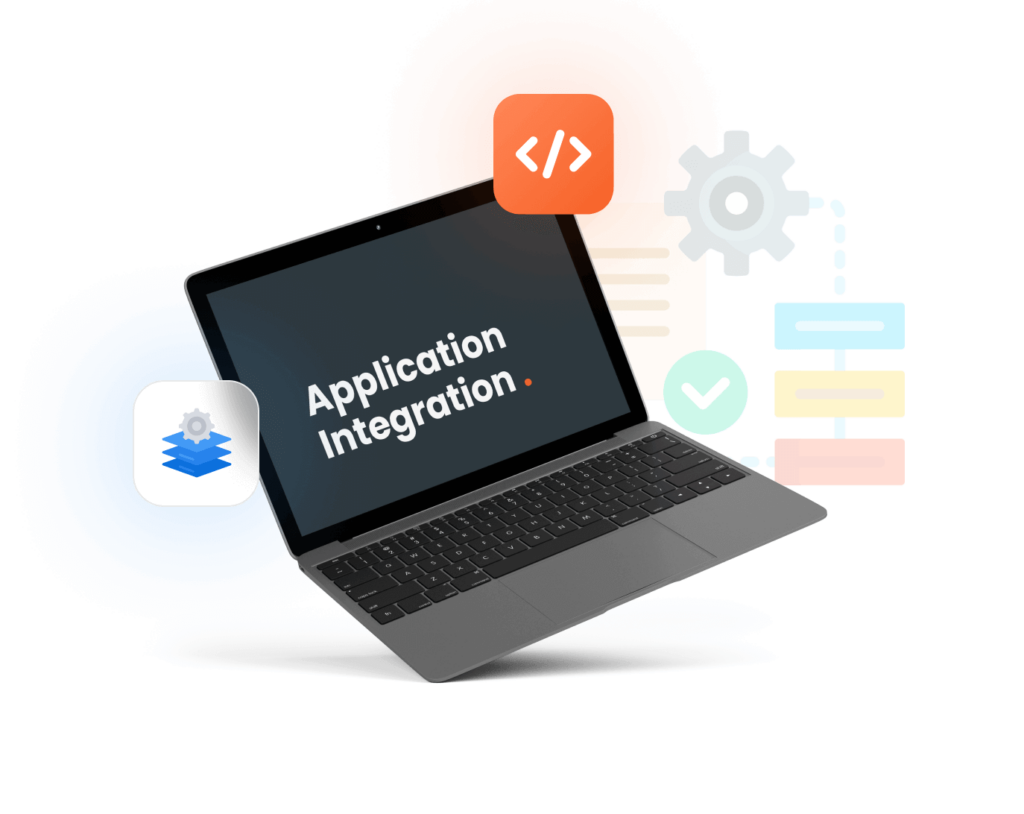> Services> Application Integration
Enterprise Application Integration
boost productivity with Enterprise Application Integration
At SlickDigital, we help organizations streamline workflows and automate tasks through Enterprise Application Integration. We tailor integrations to your unique needs, ensuring reliable data flows and optimized workflows that can help drive business value. Let us handle the integration complexities while you focus on strategy.

a reflection of our clients’ success.
Our Enterprise Application Integration Services
-
Custom Integration Architecture Design
We design a bespoke integration architecture that aligns with your business objectives and technical constraints. Our approach ensures a scalable framework for seamless connectivity and efficient data flow, accommodating both current needs and future growth.
-
Middleware & ESB Implementation
Our team deploys and configures middleware platforms and Enterprise Service Bus (ESB) solutions to facilitate seamless application communication and data exchange. Custom connectors and adapters are developed to ensure optimal system interoperability and performance.
-
Data Mapping & ETL
We execute advanced data mapping, transformation, and Extract, Transform, Load (ETL) processes to ensure consistency and compatibility during data conversion. Our solutions harmonize disparate data formats and structures, enhancing data integrity and usability across your enterprise.
-
Data Synchronization
Our robust data synchronization solutions maintain real-time consistency across applications and systems. We implement change data capture (CDC) mechanisms to ensure all platforms access up-to-date information, thereby eliminating discrepancies and supporting a unified data infrastructure.
-
Business Process Automation
We design and implement automated business workflows to streamline processes across applications. By integrating and optimizing business processes, we reduce manual tasks and enhance operational efficiency. This automation improves speed, accuracy, and operational cost-effectiveness.
-
API Management and Integration
Our team develops and integrates APIs (Application Programming Interfaces) to enable seamless communication between applications and services. We ensure that your systems can share data and interact effectively, enhancing interoperability and operational cohesion. This creates a more interconnected IT environment.
-
Cloud Integration & Hybrid Solutions
We provide end-to-end cloud integration services, including cloud-to-cloud and hybrid integration solutions. Our approach ensures smooth data flow between on-premises and cloud-based systems, optimizing the performance of your cloud resources while maintaining connectivity with legacy systems.
-
Data Security & Compliance
We implement comprehensive security measures including encryption, tokenization, and role-based access controls to safeguard your data. Our solutions ensure compliance with industry standards and regulations such as GDPR, HIPAA, and ISO 27001.
-
Legacy System Modernization
We connect legacy systems with modern applications to extend their usability and functionality. By developing custom connectors and adapters, we integrate outdated systems with new technologies, enabling you to leverage existing investments while adopting modern advancements.
Enterprise Application Integration Best Practices
Choose the Right Integration Architecture
Opt for an integration framework that meets your business needs and scalability requirements, such as Service-Oriented Architecture (SOA), Microservices Architecture, or API-led Integration.
Standardize Integration Protocols and Interfaces
Use standardized protocols (such as HTTP, SOAP, REST) and data formats (like XML, JSON) for integration to ensure compatibility and ease of communication between systems.
Adopt a Modular and Scalable Approach
Design integration solutions with modularity and scalability in mind. Use modular components and services that can be scaled independently to meet changing needs.
Ensure Comprehensive Testing and QA
Conduct rigorous testing, including unit tests, integration tests, and performance benchmarks, to validate integration solutions before deployment.
Implement Effective Change Management
Establish a structured change management process to handle updates and modifications to integration components. This includes version control, documentation, and impact analysis.


Enterprise Application Integration FAQ
Enterprise Application Integration refers to the process of connecting various software applications and systems within an organization to operate cohesively. It is crucial for streamlining IT operations, ensuring accuracy of data analytics and reporting, and enhancing overall efficiency through seamless inter-application communication and data sharing.
According to the cloud company, AWS, it enhances business agility by enabling faster adaptation to changes, such as new business requirements or market conditions. By integrating various systems and automating workflows, organizations can quickly adjust their processes, improve responsiveness, and accelerate time-to-market for new products or services.


